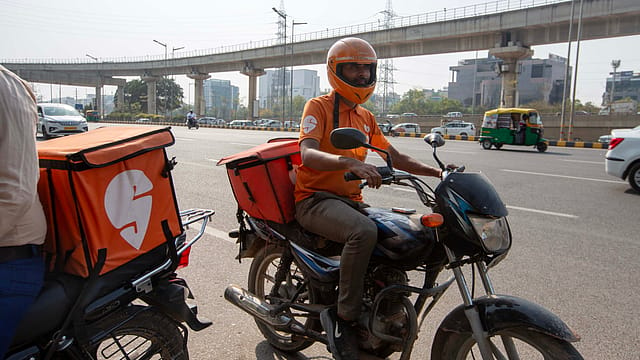Zomato effect: Swiggy's share price sees sharp fall raising investor concern over food delivery sector
ADVERTISEMENT

Foodtech platform Swiggy witnessed a significant drop in its stock price on Tuesday, January 21, falling by nearly 11% to hit an 8-week low of ₹427 per share. By the time of market closing, the scrip had fallen by over 8%, closing at ₹440.35.
This decline followed disappointing quarterly results from its primary competitor, Zomato, which raised concerns among investors about the broader food delivery sector.
The sharp fall marked the largest intraday drop for Swiggy's stock since it went public in November of the previous year. At ₹427, the stock was trading just 1.7% above its listing price of ₹420. However, Swiggy's share price is still up by nearly 13% from its issue price of ₹390, which suggested a mixed investor sentiment despite recent setbacks.
Zomato's weak performance was a major catalyst for Swiggy's decline, as explained by experts. The company's profitability for the December quarter dropped by a staggering 57.3% year-on-year (YoY), coming in at ₹59 crore. This steep decline was largely attributed to increased investments in new dark-store openings and efforts to ramp up customer acquisition in its burgeoning quick commerce (QC) business. Zomato’s losses further deepened with Blinkit, the Albinder Dhindsa-led quick-commerce arm, reporting a net loss of ₹103 crore. The company warned that it would likely remain in the red for the near term as it continues to invest heavily in store expansion.
As a result, analysts have revised their target price for Zomato downwards, causing the stock to plummet by 13.3% to ₹207.80, its lowest level in six months. The negative sentiment surrounding Zomato spilled over to Swiggy, with investors growing increasingly cautious about the financial sustainability of these high-growth, capital-intensive businesses.
Zomato's adjusted EBITDA, which had almost broken even in the previous quarter, registered a 1.3% loss in Q3FY25, as the ramp-up of dark stores led to increased operational costs. Analysts now predict that Zomato's losses will widen before the company sees a potential turnaround, estimating a break-even point in Q4FY26E. Consequently, their profit after tax (PAT) estimates for FY25-27 have been slashed by 25%.
The struggles of both Zomato and Swiggy underscore the challenges faced by food delivery companies as they grapple with profitability issues, heavy competition, and the escalating costs of expansion. With increasing investor scrutiny, the future of these companies remains uncertain as they continue to navigate the evolving market dynamics.